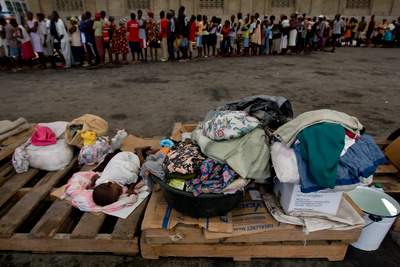The collapse of humanitarian aid ?

Bad news all around in the aid world. It is difficult, as an aidworker, to remain positive these days, and to see a light at the end of the tunnel of poverty.
Oxfam, one of the leading UK aid organisations, released "The Right to Survive", in which they estimate almost 250 million people around the world to be affected by climate-related disasters in a typical year. They project that by 2015 this number could grow by 50% to an average of more than 375 million people.
To cope with this increase, the world needs to increase its humanitarian aid spending from 2006 levels of $14.2 billion to at least $25 billion a year. (Full)
According to the OECD (Organisation for Economic Co-operation and Development) the world is already spending a whopping amount of money on development and aid:
US$136.2 billion (2003)
US$175.4 billion (2004)
US$319.8 billion (2005)
US$323.5 billion (2006)
US$470.4 billion (2007)
These figures (which include "humanitarian aid" to which Oxfam refers) combine government aid (so-called "ODA"), private donations and aid-motivated economic assistance (Source).
I have always compared the "aid world" to the "commercial world". In the latter you have a supply and demand mechanism that comes to a certain level of economical balance, in the "aid world" you have a similar balance between "a need for help" and "a supply of assistance". While this balance always ended up with a deficit, it seems the world's "need for aid" is rapidly overwhelming the world's "capacity to give" even more.
In the past year, the need for assistance increased to unprecedented levels because of the rocketing food prices which affected the poorest the most, the effects of global warming - as Oxfam stressed in its report, - and now the faulting world economy.
I do not believe, despite the best fundraising efforts, the world's "capacity to give" can increase to meet the demand. The only thing we can do, and must do, is to ensure the aid funds are spent with better targets, with a higher accountability and short term aid measures MUST be combined with longer term development.
If not, we will continue providing plasters on wooden legs. As clearly we have been doing in the past decennia.
Pictures courtesy Logan Abassi (MINUSTAH)
 Peter. Flemish, European, aid worker, expeditioner, sailor, traveller, husband, father, friend, nutcase. Not necessarily in that order.
Peter. Flemish, European, aid worker, expeditioner, sailor, traveller, husband, father, friend, nutcase. Not necessarily in that order.
0 comments:
Post a Comment